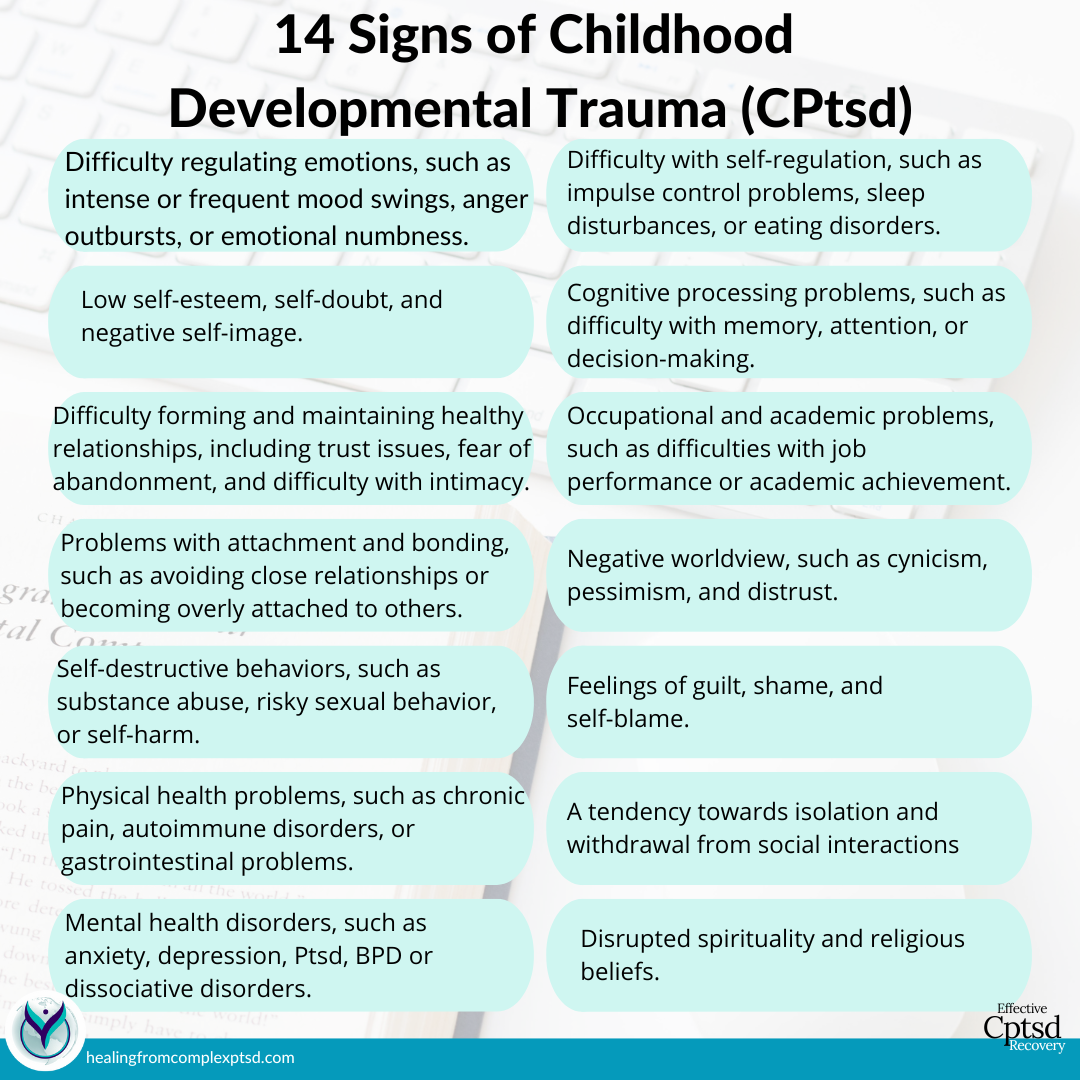Childhood trauma is an experience that can have lasting effects on a person's life. It can manifest in many ways and can impact a person's emotional, physical, and psychological well-being, often in complex ways that can be difficult to recognize or understand. Here, we'll explore 14 potential impacts of childhood trauma on development and how they can impact life as an adult.
Difficulty regulating emotions: Childhood trauma can lead to difficulties regulating emotions, such as intense or frequent mood swings, anger outbursts, or emotional numbness. This can lead to difficulty in expressing oneself appropriately, and in maintaining healthy relationships, as others may find it challenging to deal with the person's intense emotions.
Low self-esteem: Childhood trauma can cause low self-esteem, self-doubt, and negative self-image. This can result in a lack of confidence in oneself, leading to a decrease in personal achievement and overall life satisfaction.
Difficulty forming and maintaining healthy relationships: Childhood trauma can cause a person to have problems with forming and maintaining healthy relationships, including trust issues, fear of abandonment, and difficulty with intimacy. This can lead to loneliness, isolation, and an overall decrease in quality of life.
Problems with attachment and bonding: Childhood trauma can result in difficulties with attachment and bonding, such as avoiding close relationships or becoming overly attached to others. This can lead to a sense of confusion and mistrust in personal relationships, which can further contribute to feelings of isolation and loneliness.
Self-destructive behaviours: Childhood trauma can lead to self-destructive behaviors such as substance abuse, risky sexual behavior, or self-harm. These behaviors can result in both physical and mental health issues, leading to a further decrease in overall quality of life.
Physical health problems: Childhood trauma can lead to physical health problems such as chronic pain, autoimmune disorders, or gastrointestinal problems. These issues can be chronic and debilitating, leading to a decrease in overall health and wellbeing.
Mental health disorders: Childhood trauma can lead to mental health disorders such as anxiety, depression, post-traumatic stress disorder (PTSD), borderline personality disorder, or dissociative disorders. These disorders can make it difficult to function in daily life, leading to a decrease in overall quality of life.
Difficulty with self-regulation: Childhood trauma can cause difficulty with self-regulation, such as impulse control problems, sleep disturbances, or eating disorders. These difficulties can lead to poor health outcomes, further contributing to a decrease in overall quality of life.
Cognitive processing problems: Childhood trauma can cause cognitive processing problems such as difficulty with memory, attention, or decision-making. These difficulties can make it challenging to complete tasks and make good decisions, leading to a decrease in overall success and achievement.
Occupational and academic problems: Childhood trauma can cause occupational and academic problems such as difficulties with job performance or academic achievement. These issues can lead to difficulties in obtaining and maintaining employment, further contributing to a decrease in overall quality of life.
A negative worldview is a common impact of childhood trauma. When a person experiences trauma, they may struggle to see the good in people or the world around them. They may develop a sense of cynicism, pessimism, and distrust. This negative outlook can be challenging to overcome, and it can impact relationships, work, and daily life. It is important to work with a mental health professional to address these negative thought patterns and learn to develop a more positive outlook on life.
Feelings of guilt, shame, and self-blame are also common impacts of childhood trauma. When a person experiences trauma, they may feel responsible for what happened to them or believe that they somehow deserved it. These feelings of guilt and self-blame can be overwhelming and can impact self-esteem and relationships. It is important to address these feelings and learn to let go of the blame and shame that comes with trauma. Working with a mental health professional can help a person develop healthy coping mechanisms and learn to release these negative feelings.
Childhood trauma can also disrupt spirituality and religious beliefs. Trauma can shake a person's sense of safety and trust in the world, leading to a questioning of faith and spiritual beliefs. A person may feel angry or disillusioned with religion or spirituality, or they may struggle to find meaning and purpose in life. It is important to work with a spiritual or religious leader or a mental health professional to address these questions and find a sense of connection and purpose in life.
A tendency towards isolation and withdrawal from social interactions is a common impact of childhood trauma. Trauma can make it challenging to trust others and form healthy relationships. A person may feel safer and more in control when they are alone, leading to a tendency towards isolation and withdrawal. However, isolation can lead to further feelings of loneliness and depression. It is important to work with a mental health professional to develop healthy coping mechanisms and learn to form healthy relationships with others.
In conclusion, childhood trauma can impact every aspect of a person's life, from their emotions and relationships to their worldview and spirituality. It is important to seek help from a mental health professional to address the impacts of childhood trauma and learn healthy coping mechanisms. With time and support, a person can learn to navigate life as an adult and find joy and fulfillment in their relationships, work, and daily life.
Difficulty regulating emotions: Childhood trauma can lead to difficulties regulating emotions, such as intense or frequent mood swings, anger outbursts, or emotional numbness. This can lead to difficulty in expressing oneself appropriately, and in maintaining healthy relationships, as others may find it challenging to deal with the person's intense emotions.
Low self-esteem: Childhood trauma can cause low self-esteem, self-doubt, and negative self-image. This can result in a lack of confidence in oneself, leading to a decrease in personal achievement and overall life satisfaction.
Difficulty forming and maintaining healthy relationships: Childhood trauma can cause a person to have problems with forming and maintaining healthy relationships, including trust issues, fear of abandonment, and difficulty with intimacy. This can lead to loneliness, isolation, and an overall decrease in quality of life.
Problems with attachment and bonding: Childhood trauma can result in difficulties with attachment and bonding, such as avoiding close relationships or becoming overly attached to others. This can lead to a sense of confusion and mistrust in personal relationships, which can further contribute to feelings of isolation and loneliness.
Self-destructive behaviours: Childhood trauma can lead to self-destructive behaviors such as substance abuse, risky sexual behavior, or self-harm. These behaviors can result in both physical and mental health issues, leading to a further decrease in overall quality of life.
Physical health problems: Childhood trauma can lead to physical health problems such as chronic pain, autoimmune disorders, or gastrointestinal problems. These issues can be chronic and debilitating, leading to a decrease in overall health and wellbeing.
Mental health disorders: Childhood trauma can lead to mental health disorders such as anxiety, depression, post-traumatic stress disorder (PTSD), borderline personality disorder, or dissociative disorders. These disorders can make it difficult to function in daily life, leading to a decrease in overall quality of life.
Difficulty with self-regulation: Childhood trauma can cause difficulty with self-regulation, such as impulse control problems, sleep disturbances, or eating disorders. These difficulties can lead to poor health outcomes, further contributing to a decrease in overall quality of life.
Cognitive processing problems: Childhood trauma can cause cognitive processing problems such as difficulty with memory, attention, or decision-making. These difficulties can make it challenging to complete tasks and make good decisions, leading to a decrease in overall success and achievement.
Occupational and academic problems: Childhood trauma can cause occupational and academic problems such as difficulties with job performance or academic achievement. These issues can lead to difficulties in obtaining and maintaining employment, further contributing to a decrease in overall quality of life.
A negative worldview is a common impact of childhood trauma. When a person experiences trauma, they may struggle to see the good in people or the world around them. They may develop a sense of cynicism, pessimism, and distrust. This negative outlook can be challenging to overcome, and it can impact relationships, work, and daily life. It is important to work with a mental health professional to address these negative thought patterns and learn to develop a more positive outlook on life.
Feelings of guilt, shame, and self-blame are also common impacts of childhood trauma. When a person experiences trauma, they may feel responsible for what happened to them or believe that they somehow deserved it. These feelings of guilt and self-blame can be overwhelming and can impact self-esteem and relationships. It is important to address these feelings and learn to let go of the blame and shame that comes with trauma. Working with a mental health professional can help a person develop healthy coping mechanisms and learn to release these negative feelings.
Childhood trauma can also disrupt spirituality and religious beliefs. Trauma can shake a person's sense of safety and trust in the world, leading to a questioning of faith and spiritual beliefs. A person may feel angry or disillusioned with religion or spirituality, or they may struggle to find meaning and purpose in life. It is important to work with a spiritual or religious leader or a mental health professional to address these questions and find a sense of connection and purpose in life.
A tendency towards isolation and withdrawal from social interactions is a common impact of childhood trauma. Trauma can make it challenging to trust others and form healthy relationships. A person may feel safer and more in control when they are alone, leading to a tendency towards isolation and withdrawal. However, isolation can lead to further feelings of loneliness and depression. It is important to work with a mental health professional to develop healthy coping mechanisms and learn to form healthy relationships with others.
In conclusion, childhood trauma can impact every aspect of a person's life, from their emotions and relationships to their worldview and spirituality. It is important to seek help from a mental health professional to address the impacts of childhood trauma and learn healthy coping mechanisms. With time and support, a person can learn to navigate life as an adult and find joy and fulfillment in their relationships, work, and daily life.

14 potential impacts of childhood trauma on development that may appear in adulthood
Effective. | Trauma. | Recovery. | Found Here.
Learn more about complex trauma recovery coaching with Linda. For those taking a proactive approach to recovery and needing answers to help heal their whole self.

